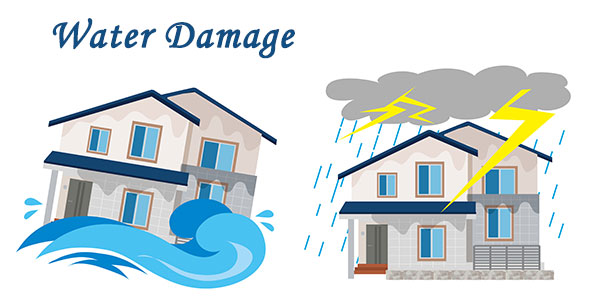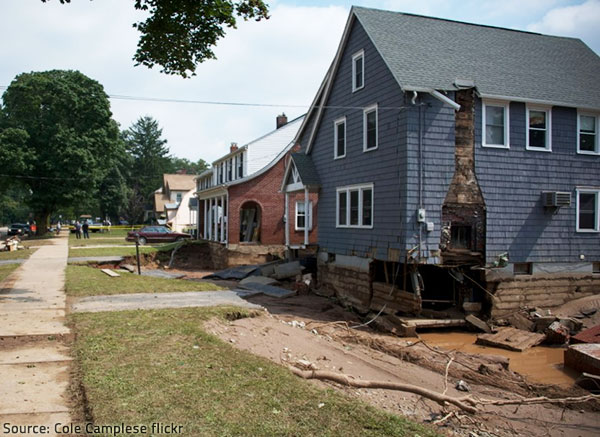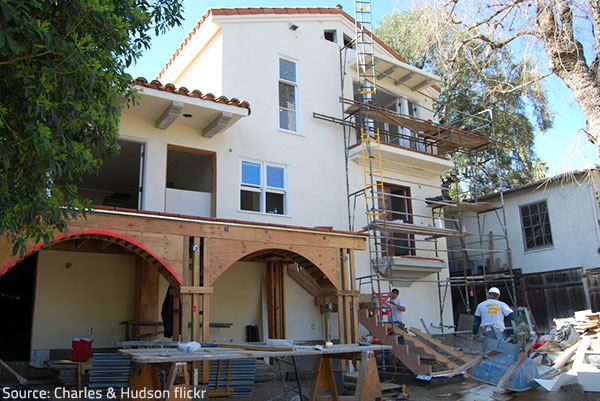

If you’re standing ankle-deep in your flooded home after a torrential rain or a burst pipe, you’ll probably not be thinking about insurance terms or claim procedures. You will be desperate to remove the water, clean up the mess, and salvage as many of your items as possible. Doing so, however, may cause more harm than good. If you throw away any damaged items or make permanent repairs before your insurance company has inspected the property and estimated the scope of damage, you may be denied coverage and not get compensated for your loss. In this case, you’ll have to pay for the repairs out of your own pocket and find a way to get your life back on track without any financial assistance.
On the other hand, if your water damage insurance claim is accepted, and you get a fair settlement, the restoration process will be much faster, easier, and lighter on your budget. To ensure a successful and problem-free claim process, however, you need to know what to do after a disaster, how to file a water damage insurance claim, and who to work with.
You’ll find all the answers you need in the insightful water damage insurance claim tips below:
Table of Contents
Your home or rental insurance contract contains important information regarding your policy’s water damage coverage, deductibles, limitations and exclusions, as well as a thorough explanation of the claim procedures and the required deadlines for filing insurance claims.
Call your insurance company immediately after a disaster. Have your policy number ready and be prepared to provide all the necessary information. Be careful not to mention the word “flood” when describing the issue (standard insurance policies don’t cover floods) and ask the insurance specialists for your recommended course of action.

Find out what exactly your homeowner’s insurance covers and make sure you get the most out of it.
Good to remember: It’s advisable to keep detailed records of your conversations with the insurance company (the date and time of the call, the name of the person you talked with, a brief description of your conversation). Make copies of any letters, notifications, and other written documents you have received from (or sent to) the insurance company and make sure you keep all the emails you’ve exchanged.
The more “evidence” you can present when making your water damage insurance claim, the better. So, make sure you:

Emergency times call for emergency measures.
Good to remember: Nothing should be thrown away, no permanent repairs should be made, and the scene should not be altered (as much as safely possible) until an adjuster comes to inspect your property and determine the scope of the damage.
Needless to say, you should do everything possible to prevent additional damage to your property and salvage as many of your belongings as possible – these mitigation measures will be considered emergency repairs and won’t affect the insurance claim process. Besides, the insurance company won’t be responsible for additional damage after the initial claim. So, you are advised to remove standing water, take water-saturated materials to a well-ventilated area to dry, board up any broken doors or windows, tarp holes in the roof, and take any other necessary measures to prevent further damage. Just make sure you keep all the receipts for the emergency repairs you’ve made, don’t throw anything away, and don’t begin reconstruction and restoration work until you and your insurance company have agreed as to the scope of damage.
You are advised to prepare a written notice to your insurance company (an official claim) as soon as you have reviewed your insurance policy and gathered the necessary information (date of water damage, location of damage, complete list of damaged items and materials, receipts for initial cleanup and emergency repairs, remediation estimates, etc.). Have in mind that it may be days (up to 15 after you’ve reported the claim) before an adjuster comes to inspect your property. And the longer it takes to reach an agreement with your insurance company, the slower and more difficult the recovery process will be, of course.

Do you know how to make an insurance claim for water damage?
1. The company will send an adjuster to your home to inspect the damage within 15 days after receiving a written notice from you. Make sure you’re home when the adjuster comes so that you can answer their questions and discuss your options;
2. The company will inform you in writing if your policy covers the sustained damage or not. If your claim is accepted, you will receive a check for the estimated cost of repairs, minus depreciation and your deductible (the amount of the claim that you’re responsible for paying yourself) within five business days.
Good to remember: The insurance company will only pay for household items and materials of the same kind and quality as the damaged ones – any desired upgrades will be your sole responsibility.
3. If your claim is rejected or if you are not satisfied with the settlement, you should demand a written explanation and contact a public adjuster to resolve the issue. If you still can’t reach an agreement with your insurer, your last resort is to file a written complaint with the local department of insurance – just visit their website or call the Consumer Help Line to get more information and request a complaint form.
You have the greatest chance for insurance claim success if you hire experienced restoration professionals to assist you in every stage of the recovery process. The specialists will provide you with an accurate damage assessment and realistic cleanup and restoration estimates, and will assist you in taking an inventory of damaged contents and finding temporary housing (if you need to move out of your property while repairs are made). The water damage restoration professionals will not only perform any required services (complete water extraction and drying, board-up and pack-out services, reconstruction and mold remediation, etc.) with maximum safety and efficiency, but will also work with your insurance company to ensure a fast and accurate settlement of your claim.
 as soon as possible." width="425" height="284" />
as soon as possible." width="425" height="284" />
Use the best water damage restoration services in your area to get your life back on track as soon as possible after a disaster.
Have in mind that you are not obliged to use the services of the contractors and cleaning vendors your insurance company works with. You can shop around for a more reliable, more experienced, or better equipped restoration and cleaning company. Research your options, ask for recommendations, and get estimates from at least 3 or 4 reputable water damage restoration companies in your area in order to choose the best professionals for your particular needs and requirements.
No matter how reliable a contractor you hire to restore your property, insist on having all insurance payments issued to you only, not directly to them. Otherwise, you risk delays in the recovery process or not getting the job done to your liking.
Last but not least, you need to know what your insurance company will pay for meals and lodgings during the restoration process. Even if your policy covers additional living expenses (temporary housing, food, and other essentials) under such circumstances, the insurance company will not pay all of the costs for maintaining your normal standard of living. Find out which expenses will be reimbursed and be careful not to spend too much pay as the compensation will probably be capped at about 20% of your total coverage. Keep a record of everything you buy while living in temporary housing and don’t forget to preserve all the receipts. Make sure you use vendors and/or organizations that will bill your insurance company directly (hotels, rental companies, etc.) whenever possible.
Being familiar with the water damage insurance claim process and understating your options will help you make informed decisions and ensure quick recovery in the unfortunate event of water damage to your property. So, make sure you know what your homeowner’s insurance covers and how to file water damage claims, even if there seems to be no danger of water damage to your property – just to be on the safe side.
Vince Sandri is a content writer and blogger with more than 12 years of experience. His expertise is in creating content related to disaster restoration, including information about preventing and reacting to natural disasters like flooding, water damage, fire and smoke damage, mold growth, storm damage and more.
Vince has been the main contributor to RestorationMasterFinder.com since 2014. Over that time, he has written numerous service pages and blogs for disaster restoration providers featured on RestorationMasterFinder.com. Vince has done extensive research and covered a wide range of topics relating to disaster restoration to help homeowners, business owners, and property managers better protect their property. He understands the problems that disasters like flooding, fire, smoke, and mold can cause as well as the best ways to respond to these issues to limit the damage.
Vince completed his Bachelor of Arts degree at Aurora University and his master’s degree at DePaul University. He has been writing SEO website pages, blogs, and press releases since 2012. Vince is also a musician and can be seen playing in the Chicago, IL area.